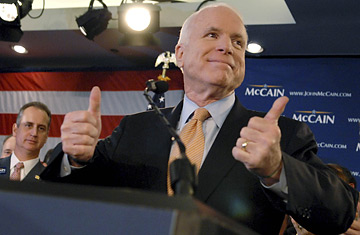
Republican presidential candidate Senator John McCain on the night of the Virginia, Maryland and Washington primary elections at a campaign rally in Alexandria, Virginia, February 12, 2008.
It was, at minimum, a predictable slight. After a trio of wins Tuesday night in Virginia, Maryland and the nation's capital, John McCain was still playing second fiddle this campaign season, his proper coronation delayed again. A week after effectively winning the Republican nomination, he still did not quite get his victory lap.
Just after 9:45 p.m., with Van Halen's piano anthem "Right Now" coursing through the speakers before a crowd of several hundred in a hotel ballroom, McCain was ready for his entrance. "The next President of the United States," thundered the announcer.
But no candidate appeared. About five minutes passed. The applause died down. Then the announcer came back on the public address. "In consideration of another network broadcast our program will begin in just a few minutes," the voice said.
The problem, it turned out, was Barack Obama, who was being carried live on cable news from his victory speech in Wisconsin, before a crowd that appeared to number many thousand. McCain had to wait more than ten minutes before McCain could get the networks to cut away.
Ironically, McCain's victory speech had been written to focus on what he termed the emptiness of Obama's inspirational appeal. "To encourage a country with only rhetoric rather than sound and proven ideas that trust in the strength and courage of free people is not a promise of hope," McCain said. "It is a platitude."
But Obama was not the only thorn in the Arizona Senator's side preventing him from fully celebrating his victory. Mike Huckabee, who has staked his mathematically slim chances for the nomination on a miracle, made a surprisingly strong showing in Virginia, a state where polls late last week showed McCain with a 2-to-1 lead. McCain won the state by nearly 10 points, but the exit polls carved his problems in clear relief. McCain lost self-identified "conservatives" to Huckabee by a margin of 25% to 51%. He lost "talk radio listeners" by a margin of 38% to 48%. He lost evangelicals, who can make up as much of a third of the Republican vote in a general election, by a margin of 28% to 61%. And while none of this should mean that Huckabee will be able to prevent him from getting the nomination, it does mean that McCain will have to continue to work harder to prove his conservative credentials to the skeptical wing of the party, especially in a big, crucial state like Texas, which holds its delegate-rich contest on March 4.
McCain's twin woes on an otherwise triumphant night neatly capped a week in which he has been taking flak from two directions. Even as a sizable portion of conservative voters still reject his candidacy, he has faced renewed onslaughts from Democrats like Obama, who spoke in Wisconsin of the "Bush-McCain Republicans," in an attempt to tie McCain to the unpopular President and a failed war strategy. The Democratic Party has also started a concerted campaign to define McCain as a clone of George W. Bush, a caricature than paints over many important nuances.
"A staunch supporter of the failed Bush policies from Day One," read a press release released by Democratic National Committee on Tuesday, "the truth is John McCain was part of the right-wing chorus that claimed victory in Iraq would be easy." This line of attack is, as might be expected, somewhat misleading. McCain was an early supporter of the March 2003 invasion of Iraq, who did join the chorus of people who said he expected the initial invasion to go smoothly. But by August of the same year, he had began to become a public critic of the way the Bush Administration was executing the war.
At a November 2003 speech to the Council on Foreign Relations, McCain suggested that "somebody is cooking the books" on U.S. claims of increased Iraqi security forces in the country, and called for more U.S. troops to stabilize the nation. "Simply put, there does not appear to be a strategy behind our current force level," he told the group, just one day after then Secretary of Defense Donald Rumsfeld had given several interviews defending the troop levels. McCain's criticism of the war's execution only grew more pointed in the coming years, though he campaigned enthusiastically for Bush's reelection in 2004 and then vigorously supported (and even took credit for) the surge of the last year.
Democrats hope they can make these nuances, or their absence, the subject of debate in the general election — and they will never miss an opportunity to remind voters of McCain's now notorious comment that it could take the U.S. 100 years to bring lasting peace to Iraq. In his victory speech Tuesday, McCain said he was eager for the discussion. "We do not yet know for certain who will have the honor of being the Democratic Party's nominee for President," he said. "But we know where either of their candidates will lead this country, and we dare not let them."
McCain closed his speech with one of Obama's most famous lines. "I am fired up and ready to go," he told the cheering crowd. It was, for McCain, a statement of hope as much as fact. With Obama's star power, and Huckabee's resilience, McCain is still waiting for the moment when his general election campaign can take off in earnest.
